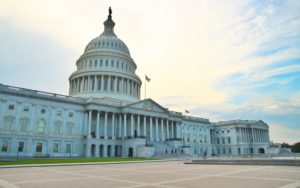
DOJ and DHS end a pandemic order that allowed border authorities to turn away migrants, Montana bans TikTok, and more…
IN THE NEWS
- The U.S. Department of Justice and the U.S. Department of Homeland Security issued a final rule responding to the expiration of Title 42, a 2020 order that allowed authorities to turn migrants away at the United States border to mitigate the spread of COVID-19. The agencies anticipated that Title 42’s expiration could result in an influx of migrants at the United States’s southwest border and advised migrants wishing to enter the United States to do so through legal, orderly means. Under the rule, if migrant noncitizens enter the United States illegally, they will be presumed ineligible for asylum, absent “exceptionally compelling circumstances” such as medical emergencies, severe threat, or evidence of human trafficking. The provisions in the new rule—along with potential future expansions of lawful pathways to immigration—are aimed at keeping migration at the border at manageable levels and reducing human smuggling into the United States.
- Montana Governor Greg Gianforte signed a bill into law banning the social media application TikTok in the state. In December, Gianforte had called the application “a significant risk to the security of our state and Montanans’ sensitive data” when he announced a ban on using TikTok on state-owned equipment. But the latest ban, the first of its kind in the United States, will completely prohibit both TikTok users and ByteDance—TikTok’s parent company—from operating the application in the state. Gianforte also announced bans on other applications that provide “personal information or data to foreign adversaries from the state network,” such as the messaging applications WeChat and Telegram.
- Two states advanced bills restricting abortion access. A bill in North Carolina banning abortions after 12 weeks was adopted after the state’s Republican-led legislature overrode Governor Roy Cooper’s veto of the bill. In addition, the South Carolina House of Representatives passed a bill banning abortions after six weeks. Until the South Carolina Senate passes the bill and Governor Henry McMaster signs it, abortion in South Carolina remains legal before 22 weeks. Jamie Lockhart, executive director of Planned Parenthood Advocates of Virginia, contended that these bans will be “devastating for abortion access in the South.”
- The Texas legislature voted to prohibit transgender minors from obtaining puberty blockers, hormone therapies, or transition-related surgeries. If signed by Governor Greg Abbott, the bill would require all transgender minors currently receiving treatment to be “weaned off” of gender-affirming treatment that the American Academy of Pediatrics currently recommends for transgender youth. The majority-Republican legislature passed the bill along party lines, making Texas the largest state to restrict transgender children’s access to medical treatment. After the legislature’s vote, Ash Hall, policy and advocacy strategist for the Texas ACLU, stated that “this legislation is vicious, it’s cruel, and it’s blatantly unconstitutional.”
- The Equal Employment Opportunity Commission (EEOC) updated its technical recommendations for COVID-19 pandemic-related employment accommodations after the U.S. Department of Health and Human Services ended the federal public health emergency declaration on May 11. The EEOC specified that long COVID, a condition distinct from COVID-19, may qualify as a disability under the Americans with Disabilities Act and necessitate accommodations, such as quiet workspaces, rest breaks, flexible schedules, and alternative lighting. The EEOC stressed that employers may not automatically end pandemic-related accommodations without case-by-case considerations, and it encouraged employers to implement low-cost accommodations where possible.
- The U.S. Court of Appeals for the Fifth Circuit issued an administrative stay of a federal district judge’s decision to strike down portions of the Affordable Care Act (ACA) that require insurers to cover preventative care, such as screenings for cancer, diabetes, and HIV. The district judge held that HIV-prevention coverage mandates under the ACA violated freedom of religion protections under the Religious Freedom Restoration Act. Although insurers are unlikely to stop coverage immediately as a result of the Fifth Circuit’s decision, John Cogan of the University of Connecticut School of Law warned that the lawsuit itself implicates concerns of “never-ending litigation” around the ACA.
- A bipartisan group of U.S. lawmakers introduced legislation that would prevent automakers from eliminating AM broadcast radio in new vehicles, citing safety concerns. AM radio—which has typically been provided in all vehicles for free—provides emergency alerts, weather warnings, and news. But many car manufacturers, such as Tesla and Ford, have removed AM radio from new vehicles or placed access to it behind paywalls. The proposed bill would require automakers to keep AM radio in vehicles without charging additional fees. Federal Communications Commission Chair Jessica Rosenworcel contended there is a “clear public safety imperative” to keeping AM radio in cars to ensure that all drivers have access to “emergency alerts and key warnings” while on the road.
- The Fifth Circuit heard arguments over a federal judge’s preliminary ruling that invalidated the approval of the abortion medication mifepristone by the U.S. Food and Drug Administration (FDA). The plaintiffs, an anti-abortion organization called the Alliance for Hippocratic Medicine, argued that mifepristone is unsafe and that FDA failed to follow regulatory procedures when it approved the drug in 2000. Counsel for FDA countered that the suit should be dismissed because plaintiffs brought their suit too late and will not suffer any actual injury if the FDA’s approval of the drug is maintained.
WHAT WE’RE READING THIS WEEK
- In a Brookings Institution report, Brookings’s Sanjay Patnaik, Director of the Center on Regulation and Markets, and Robert E. Litan, Nonresident Senior Fellow, discussed options for regulating TikTok to rein in its negative effects. Patnaik and Litan described those effects, including lower self-esteem in teenagers, threats to U.S. national security, misinformation campaigns to influence voters, and risks to data privacy. Patnaik and Litan called on regulators to audit TikTok’s source code and require social media platforms to develop better age verification practices, among other measures.
- In a European Corporate Governance Institute article, B. Espen Eckbo of Dartmouth College, Knut Nygaard of the University of Sheffield, and Karin S. Thorburn of the The Wharton School of the University of Pennsylvania found that a Norwegian law that requires that women make up at least 40 percent of corporate boards did not reduce the value of publicly traded companies. Eckbo, Nygaard, and Thorburn explained that, on average, the companies’ stock prices remained the same following the implementation of the law in 2005. In addition, Eckbo, Nygaard, and Thorburn noted that the number of female board members in Norway grew from 5 percent to 40 percent two years after the law took effect.
- In a Brookings Institution article, Aaron Klein, a senior fellow at Brookings, argued that the Federal Reserve should not be responsible for regulating banks. Klein explained that the Federal Reserve played a role in recent bank failures such as the collapse of Silicon Valley Bank because it did not intervene when the banks made risky investments. Klein asserted that the Federal Reserve failed to provide adequate oversight because its top priority is monetary policy, not regulation. Klein urged the U.S. Congress to move bank regulation authority from the Federal Reserve to agencies that specialize in regulation, such as the Office of the Comptroller of the Currency and the Federal Deposit Insurance Corporation.
EDITOR’S CHOICE
- In an essay in The Regulatory Review, Shoba Sivaprasad Wadhia, associate dean and clinical professor of law at Penn State Law in University Park, discussed the U.S. Supreme Court’s decision to uphold the Biden-Harris Administration’s termination of the “Remain in Mexico” policy. Under the policy, which President Joseph R. Biden moved to terminate in 2021, U.S. immigration officials required certain noncitizens to wait in Mexico until their court dates concerning their immigration status. Wadhia called the Court’s decision “a sound victory for immigration and refugee advocates and the thousands of asylum seekers subject to” the policy. But Wadhia also cautioned that the human toll of the policy has been substantial due to the over 70,000 noncitizens forced to await their hearings without legal representation.



